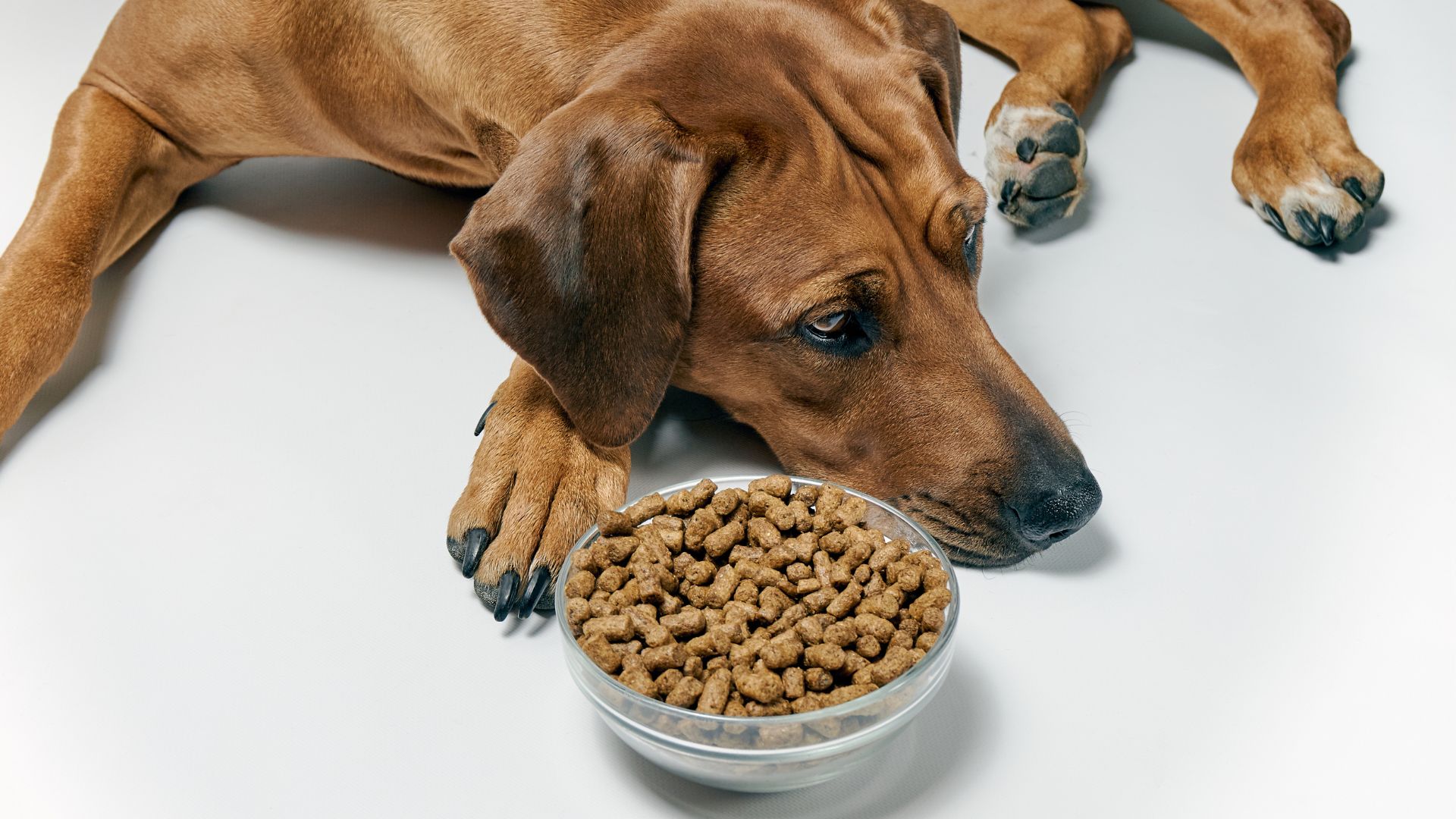All of us who share our lives with a dog know that there are few things that excite them more than the word “food”.
So when that enthusiasm wears off, it’s normal to be overcome with worry. If you’re asking yourself “Why won’t my dog eat?”, you’re in the right place. This article seeks to offer you a comprehensive guide to understand the possible reasons behind your four-legged friend’s loss of appetite and how you can help him.
Common causes of loss of appetite in dogs
Loss of appetite in dogs can be of concern to pet owners. Some common causes that can lead to this problem include dental problems, such as cavities or gum disease, gastrointestinal problems, changes in routine, age-related issues, medical conditions and external factors. Identifying and addressing these underlying causes is essential to helping your dog regain enthusiasm for food.
Can dogs eat bananas?
Dental problems, such as cavities or gum disease, can cause pain or discomfort when eating, causing the dog to lose interest in food. Similarly, gastrointestinal problems may cause nausea or discomfort, resulting in decreased appetite. It is also important to consider any recent alterations in the dog’s environment or daily routine, as stress or anxiety can also affect the dog’s appetite.
Age-related problems can also be a factor in loss of appetite in dogs. Older dogs may have a reduced sense of smell or taste, making food less appealing. In addition, certain medical conditions, such as liver or kidney disease, can influence a dog’s appetite and general health. It is essential to monitor your dog’s eating habits and consult a veterinarian if you notice a prolonged loss of appetite. In some cases, loss of appetite may be a symptom of a more serious underlying condition that requires medical attention. By understanding and addressing these common causes, you can help your dog maintain a balanced and healthy diet.
What to do when your dog refuses to eat
When your four-legged companion refuses to eat, it is important to act and address the problem immediately. As a responsible pet owner, it is important to investigate any changes in their environment or routine that may be causing their loss of appetite. Dogs can be sensitive to disturbances and stress or discomfort can influence their eating habits. To encourage them to eat, it is essential to provide a calm and comfortable environment, and offering their favorite foods or treats may be the solution. In addition, a little extra attention and love can sometimes be enough to encourage them to eat.
It is also important to observe their behavior and examine for other symptoms, such as vomiting, diarrhea or exhaustion. Loss of appetite may be a symptom of an underlying health problem, such as dental problems, gastrointestinal disorders or infections. If there are worrying signs, it is important to consult a veterinarian to ensure your dog’s well-being. Early detection and treatment of any medical problems can be essential to ensure your health.
Can dogs eat strawberries?
In cases where the cause of your dog’s loss of appetite is unknown, it is recommended to seek professional advice from a veterinarian. They have the knowledge and experience to provide help tailored to your puppy’s individual needs. Your veterinarian may recommend a specialized diet, including meat or chicken, administer medications or suggest additional tests to diagnose any underlying conditions. Following their advice and instructions is vital to ensure your dog’s health. Remember, your veterinarian is your ally in dealing with this delicate situation.
Consultation of a veterinarian for loss of appetite
When your canine companion stops eating, it may be cause for concern and warrants a visit to the veterinarian. To effectively address the problem, your veterinarian will perform a thorough examination and perform the necessary tests to determine the cause of your dog’s lack of appetite. By considering recent changes in your puppy’s environment or routine, they will be able to identify any stressors or anxiety triggers that may be contributing to his lack of appetite.
To gain a better understanding of the situation, the veterinarian may recommend additional diagnostic tests, such as blood tests, radiographs or ultrasounds. Through these tests, they will be able to rule out any underlying medical problems and provide you with valuable information about the root cause of the problem. They will also explain any findings and discuss available treatment options, such as medications, dietary changes or additional therapies.
Which fruits your dog can eat and which ones you should avoid
In addition to diagnosing and treating poor appetite, consulting a veterinarian can also be beneficial for guidance and support. With extensive knowledge and experience, veterinarians can provide valuable advice on how to stimulate your puppy’s appetite, as well as nutritional recommendations. Ultimately, seeking professional help is the best way to ensure the well-being and health of your beloved pet.
Tips for dealing with lack of appetite in dogs
When it comes to caring for your beloved furry friend, lack of appetite can be a cause for concern. Fortunately, there are several tips that can help you manage the situation and make sure your puppy gets the nutrition it needs. First, to stimulate your appetite, create a calm and stress-free environment during mealtime. Eliminate any potential distractions and provide a quiet space that makes them feel comfortable. Also, try changing their eating routine by offering smaller, more frequent meals throughout the day. This can help make eating more manageable and stimulate your appetite.
Another helpful suggestion is to provide a variety of food options. Dogs can become bored with the same foods, which can lead to a lack of interest in eating. Experiment with different flavors and textures to find something they like. You can also try adding some tasty toppings, such as a little broth or some grated cheese, to make their food more appealing. Remember to introduce any new food gradually to avoid digestive discomfort.
Which fruits your dog can eat and which ones you should avoid
In addition to a nutritious diet, another way to help your dog’s appetite is to make sure they get regular exercise and mental stimulation. Physical activity helps stimulate their appetite and keeps them fit and healthy. Take your dog for regular walks and participate in play sessions to increase his energy level. Mental stimulation, such as puzzle toys or training exercises, can also help stimulate their appetite and make them want to eat. Be sure to incorporate physical and mental activities into your dog’s daily routine.
Finally, it is important to monitor your dog’s general health and make any necessary adjustments to his diet. Lack of appetite can sometimes be a sign of an underlying medical problem, so it is important to watch their weight, energy levels and behavior. If your puppy continues to refuse food or shows other worrisome symptoms, it is important to consult a veterinarian. Early intervention is key to ensuring your dog’s well-being and addressing any health issues they may have.
Searching for medical problems in dogs that refuse to eat
Looking for any medical problems that may be causing a dog to refuse to eat is an important step in understanding the underlying causes of their lack of appetite. Dental problems, such as gum infections or cavities, can cause discomfort when eating, resulting in a lack of interest in food. Therefore, it is necessary to visit the veterinarian to evaluate the pet’s dental health and receive the appropriate treatment.
Do you know the benefits of feeding your dog natural food? Don’t miss it!
In addition, gastrointestinal problems such as gastritis, pancreatitis or intestinal obstructions can cause nausea, vomiting and decreased appetite. If the dog shows signs of discomfort, such as abdominal pain or diarrhea, it is essential to consult a veterinarian to determine the best course of action. Diagnostic tests such as blood tests, stool tests or imaging studies may be necessary to identify the underlying cause and provide appropriate treatment.
In some cases, lack of appetite in dogs could be a sign of more serious diseases, such as liver or kidney disease. These problems can affect the functioning of important organs, resulting in decreased appetite. If the dog shows other symptoms, such as excessive thirst, weight loss or lethargy, it is imperative to seek immediate veterinary attention. The veterinarian will perform a complete examination and may recommend additional tests, such as blood work or ultrasound, to diagnose and treat any underlying medical problems.
Finally, it is important to remember that certain medications or treatments can cause a lack of appetite in dogs. For example, chemotherapy or certain pain medications may influence your desire to eat. Therefore, it is essential to discuss any potential side effects with your veterinarian. They may adjust the treatment plan or suggest additional measures, such as appetite stimulants, to help the pet regain its appetite and maintain its overall health.
Making healthy dog food choices
Maintaining a balanced diet for dogs is critical to their overall health and well-being, especially in cases of picky eaters or dogs with poor appetites. To ensure that your dietary needs are met, it is important to include a variety of high-quality proteins and nutrient-rich ingredients in your meals. Lean meats, such as chicken or turkey, as well as fish, provide essential vitamins and minerals to support your diet. In addition, adding fruits and vegetables, such as carrots, blueberries and sweet potatoes, can promote good health.
Do you know the benefits of feeding your dog natural food? Don’t miss it!
In addition to protein and produce, incorporating whole grains into their diet can provide them with needed carbohydrates and fiber. Select whole grains, such as brown rice or quinoa, rather than processed or stuffed grains, to maintain your energy levels and maintain a healthy weight. To avoid possible sensitivities or allergies, it is important to identify any potential food allergies or intolerances. In addition, to ensure that their meals are nutritious, pet owners should avoid artificial additives, preservatives and excessive amounts of salt or sugar. By taking these aspects into account, pet owners can make informed decisions and ensure that their puppy’s nutritional needs are met.
In conclusion, when faced with a dog that refuses to eat, it is crucial to consider the underlying causes and take appropriate action.
Whether due to a temporary loss of appetite or a more serious medical problem, it is always recommended to consult a veterinarian. In addition, implementing tips such as offering a variety of healthy food choices and monitoring for any changes in behavior or physical symptoms can help resolve the problem. Remember, a dog’s refusal to eat should not be taken lightly, as proper nutrition is essential to its overall well-being. By addressing the problem quickly and making informed decisions, we can ensure that our furry friends receive the nutrition they need to thrive. So, if your dog doesn’t want to eat, don’t hesitate to seek professional advice and explore different strategies to encourage him to enjoy his meals again.








